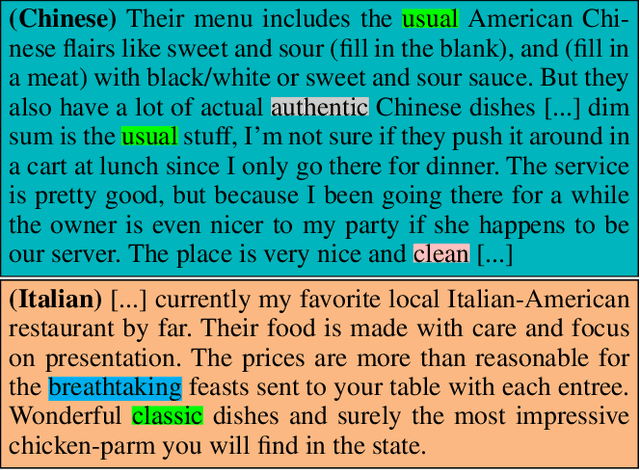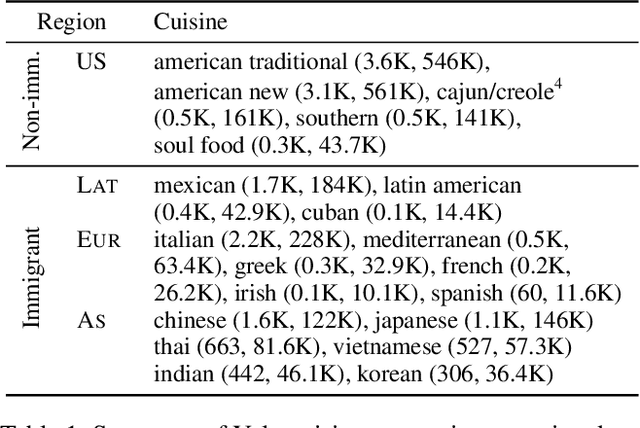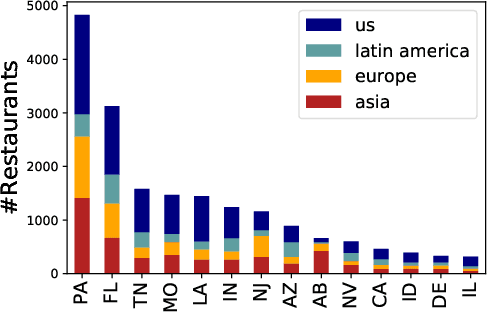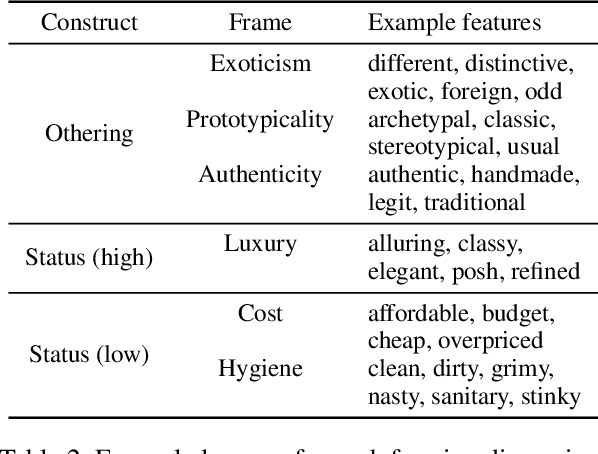Yiwei Luo
Othering and low prestige framing of immigrant cuisines in US restaurant reviews and large language models
Jul 14, 2023



Abstract:Identifying and understanding implicit attitudes toward food can help efforts to mitigate social prejudice due to food's pervasive role as a marker of cultural and ethnic identity. Stereotypes about food are a form of microaggression that contribute to harmful public discourse that may in turn perpetuate prejudice toward ethnic groups and negatively impact economic outcomes for restaurants. Through careful linguistic analyses, we evaluate social theories about attitudes toward immigrant cuisine in a large-scale study of framing differences in 2.1M English language Yelp reviews of restaurants in 14 US states. Controlling for factors such as restaurant price and neighborhood racial diversity, we find that immigrant cuisines are more likely to be framed in objectifying and othering terms of authenticity (e.g., authentic, traditional), exoticism (e.g., exotic, different), and prototypicality (e.g., typical, usual), but that non-Western immigrant cuisines (e.g., Indian, Mexican) receive more othering than European cuisines (e.g., French, Italian). We further find that non-Western immigrant cuisines are framed less positively and as lower status, being evaluated in terms of affordability and hygiene. Finally, we show that reviews generated by large language models (LLMs) reproduce many of the same framing tendencies. Our results empirically corroborate social theories of taste and gastronomic stereotyping, and reveal linguistic processes by which such attitudes are reified.
DeSMOG: Detecting Stance in Media On Global Warming
Oct 28, 2020



Abstract:Citing opinions is a powerful yet understudied strategy in argumentation. For example, an environmental activist might say, "Leading scientists agree that global warming is a serious concern," framing a clause which affirms their own stance ("that global warming is serious") as an opinion endorsed ("[scientists] agree") by a reputable source ("leading"). In contrast, a global warming denier might frame the same clause as the opinion of an untrustworthy source with a predicate connoting doubt: "Mistaken scientists claim [...]." Our work studies opinion-framing in the global warming (GW) debate, an increasingly partisan issue that has received little attention in NLP. We introduce DeSMOG, a dataset of stance-labeled GW sentences, and train a BERT classifier to study novel aspects of argumentation in how different sides of a debate represent their own and each other's opinions. From 56K news articles, we find that similar linguistic devices for self-affirming and opponent-doubting discourse are used across GW-accepting and skeptic media, though GW-skeptical media shows more opponent-doubt. We also find that authors often characterize sources as hypocritical, by ascribing opinions expressing the author's own view to source entities known to publicly endorse the opposing view. We release our stance dataset, model, and lexicons of framing devices for future work on opinion-framing and the automatic detection of GW stance.
* 9 pages, 6 figures (excluding references and appendices). To appear in Findings of EMNLP 2020
 Add to Chrome
Add to Chrome Add to Firefox
Add to Firefox Add to Edge
Add to Edge